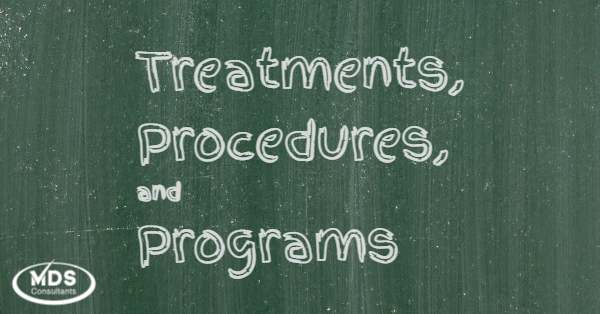This post is part of the MDS 2023 Countdown series. Disclaimer. Current as of December 9, 2023
WHAT YOU CAN EXPECT TO SEE
What is Changing with Section O?
When you first look at the draft of section O item O0110 special treatments, procedures, and programs, there are three columns instead of the familiar and long-standing two columns. Coding for section O0110A1-M2 items will no longer be broken down by, “While NOT a Resident” and/or “While a Resident.”
The proposed columns for section O0110 include “On Admission” – which has a look-back period of days 1 through 3 of the SNF PPS stay – starting with the date entered in A2400B.
The second column is “While a Resident.” These items are coded if performed while a resident of “this” facility and within the last 14 days.
Lastly, the third column is coded “At Discharge. “The assessment period for this column is the last 3 days of the SNF PPS stay ending on the date entered in item A2400C.

Adding a third column to section O0110 is not the only change.
Several of the special treatments, procedures, and programs have been expanded upon and impact the “On Admission” and “At Discharge” columns. The categories that see expansion are chemotherapy, oxygen therapy, suctioning, IV medications, and dialysis.
Section O0110 sees the addition of an added item. MDS Coordinators will now need to code if the resident has IV access and will need to identify the type of access (i.e., peripheral, midline, or central) in the “On Admission” and “At Discharge” columns.


What do the Changes Mean?
The MDS Assessment has several different look-back periods that MDS Coordinators need to be aware of when completing the MDS.
Section O0110 is one of the sections in the MDS that has new look-back periods that MDS Coordinators must know when coding.
It is important to note that the coding of the items in section O will have a greater impact on Standardized Patient Assessment Data Element (SPADEs). SPADEs were developed with the goal of improving care coordination, interoperability, and Medicare outcomes.
MDS Coordinators will need to ensure all necessary documentation is obtained and utilized to code the items accurately and proficiently in section O0110.
Recommendations from MDS Consultants
Do not wait! To be ready for the finalized versions of the MDS assessments, MDS Coordinators and other members of the interdisciplinary team should begin preparing NOW!
Since the draft with anticipated changes was released on September 1, 2022, this has given facilities more than a year to get ready. Staff training and education will be a crucial component in being well prepared for October 1, 2023, effective date.
For section O0110, MDS Coordinators should meet with Admissions Coordinators to explain the importance and necessity of obtaining all necessary hospital documentation from hospital discharge planners (i.e., progress notes, medication administration record, physician documentation, discharge summary, etc.).
It has always been important to have this information to complete the MDS. The new specifications for coding items in section O0110and the completeness of the documentation provided by the hospital will impact how the items in the “On Admission” column is coded.
